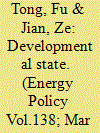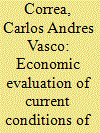| Srl | Item |
| 1 |
ID:
160001


|
|
|
|
|
| Summary/Abstract |
Allocative inefficiency in agriculture is an issue puzzling researchers and policy‐makers in China. Based on household data from the China Family Panel Studies of 2012, the present paper quantifies the potential distortions in China's agricultural production and examines their underlying determinants across regions. The results reveal that there are different levels of distortions across regions. The Middle region is facing the greatest distortion. Increases in machinery input, the proportion of non‐farm income and effective labor input will reduce distortions. Household saving, farmland rent and farmland size are significantly positively related to distortions. There is a complementary effect between labor and farmland in alleviating production inefficiency, but substitution effects exist between capital and farmland and also capital and labor. The increase in farmland size will aggravate the impact of capital on distortions. Given the constraint of super small‐scale farmland, facilitating land transfer is a necessary precondition for improving allocative efficiency.
|
|
|
|
|
|
|
|
|
|
|
|
|
|
|
|
| 2 |
ID:
171521


|
|
|
|
|
| Summary/Abstract |
Fossil fuel has been the main raw material in electricity generation though it is also the source of greenhouse gases and anthropogenic emissions from air pollution. To minimize the consumption of fossil fuel out of environmental concern, electricity needs to be allocated efficiently. Mainstream economics advocates arm’s-length regulation in allocation of utility products, but regulatory systems in most developing countries are underdeveloped. To the best of our knowledge, this paper offers the first attempt to identify that the trajectory of a developmental state is an option to a developing country. With micro-evidence from China, we document that more reliable electricity is supplied to firms with high value added, with robustness to the potential endogeneity bias. Thus, we find that electricity-allocation efficiency in China is positive and causally meaningful. As we further show, three important conditions of a developmental state determine allocative efficiency: political stability promotes allocative efficiency; whereas both corruption and harmful tax policies reduce allocative efficiency. Ultimately, we show that electricity in a developing country can be allocated efficiently by a developmental state even though its utility regulations are not mature.
|
|
|
|
|
|
|
|
|
|
|
|
|
|
|
|
| 3 |
ID:
112890


|
|
|
|
|
| Publication |
2012.
|
| Summary/Abstract |
This study uses microeconomic data from the transportation systems of land cargo in Colombia: rail and trucking, to determine their degree of allocative efficiency through the non-parametric method Data Envelopment Analysis DEA. The average overall efficiency found was 74.4% for trains and 20.56% for trucks. These figures indicate that rail is more efficient in the allocation of resources. This means that trains in Colombia use their input better than trucks to maximize their production, given the costs and technological characteristics of each system. This is a signal for the design of a public policy for investment in transportation infrastructure that seeks to raise the competitiveness of Colombian exports, investing not only in roads but in complementary systems such as railways too.
|
|
|
|
|
|
|
|
|
|
|
|
|
|
|
|